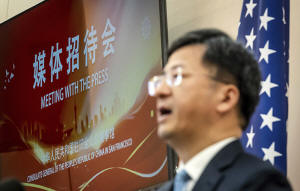China is taking issue with Trump's move to link tariffs to fentanyl
[March 13, 2025] BEIJING
(AP) — U.S. President Donald Trump threw a curve ball at China by
linking the fentanyl issue to his tariffs on imports. The Chinese
government is swinging back.
First it issued a report detailing its efforts to control the illegal
trade in fentanyl, specifically the ingredients for the opioid that are
made in China. Then, the Chinese foreign minister blasted the U.S. for
responding to Beijing's goodwill with tariffs. And this week, Chinese
officials expressed their indignation at a rare background briefing with
journalists.
“In the spirit of humanity, China assisted the U.S. in various ways,”
Foreign Minister Wang Yi told journalists last week in an annual
appearance before the media. "The U.S. should not meet good with evil or
even impose arbitrary tariffs. No responsible major country should do
that.”
Trump cited the fentanyl issue as the reason for imposing a 10% tariff
on all Chinese imports in early February, on top of any existing duties.
He doubled that to 20% earlier this month. He also has cited fentanyl,
along with other reasons, for imposing tariffs on Canada and Mexico.
What Trump is saying
In his executive order on the first 10% tariff, Trump accused China of
subsidizing chemical companies to export fentanyl and related “precursor
chemicals” and of providing a safe haven for Chinese criminal
organizations that launder the revenues from the opioid trade.
It's not unusual for the Chinese government to subsidize industries, and
the precursor chemicals are also used to make legal painkillers. But
some of the production finds it way to Mexican drug cartels who make
fentanyl and send it to the United States.

“Despite multiple attempts to resolve this crisis at its root source
through bilateral dialogue, PRC officials have failed to follow through
with the decisive actions needed to stem the flow of precursor chemicals
to known criminal cartels,” the statement said, referring to China by
the acronym for the People’s Republic of China, its official name.
China's response
The Chinese government hit back both times Trump imposed tariffs with
its own duties on selected U.S. products and other measures aimed at
American companies. Analysts have described the response as a measured
one designed to try to avoid an escalation of the trade war, which could
deal a blow to an already sluggish Chinese economy.
[to top of second column] |

Zhang Jianmin, the consul general of the People's Republic of China
in San Francisco, addresses President Donald Trump's tariffs on
China during a meeting with the press at his home in San Francisco,
Wednesday, March 12, 2025. (Carlos Avila Gonzalez/San Francisco
Chronicle via AP)
 The government's report on its
fentanyl-related actions said that China and the U.S. have held
multiple high-level meetings since early last year to promote
cooperation, and that its Narcotics Control Bureau holds regular
exchanges with the U.S. Drug Enforcement Agency.
China is committed to cooperation, the report said, “but firmly
opposes the U.S. imposition of unlawful sanctions and unreasonable
pressure on China on the pretext of responding to fentanyl-related
issues."
From Biden to Trump
Under former President Joe Biden, cooperation on fentanyl was
relaunched in early 2024 after falling victim to geopolitics in
2022. In August of that year, a visit to Taiwan by a top U.S.
legislator, then-House Speaker Nancy Pelosi, angered China, and the
government responded by cutting off talks on a range of issues
including drug control.
A rapprochement in late 2023, negotiated over several months, led to
a meeting on fentanyl in January of last year. Drug enforcement,
like climate, was held up as an area where the two countries could
cooperate despite growing differences and their military, economic
and technological competition.
Now Trump, back in the White House after a four-year hiatus, is
trying to shift the playing field in the U.S.-China relationship. So
far, China has indicated it won't blink.
“If the American side goes further down this wrong path, we will
fight to the end,” Commerce Minister Wang Wentao said last week.
All contents © copyright 2025 Associated Press. All rights reserved |